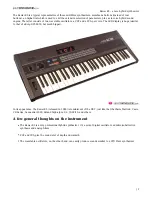
43
Chapter 5: Effects Section
EFFECTS SECTION
Room
programs simulate small rooms with high frequency absorption caused
by drapes and furniture.
Plates
simulate plate type reverbs with their tight, dense early reflections and
sharp reverb build-up.
Chambers
simulate medium sized rooms with hard reflective surfaces.
Hall
programs recreate the open, spacious ambience of large concert halls.
Early Reflection
programs consist of the reflection cluster only without the
reverb decay. These effects are similar to a multiple tap delay line and have a
single adjustable parameter - Ambience.
The special reverbs
Rain & Shimmer
are variations of the early reflection
programs and consist of a dense group of short echoes followed by longer
echoes.
FXA:Hall 1
Decay Time: 165
Place the cursor underneath the reverb name and use the data entry control to
change the type of reverb. Moving the cursor to the lower line allows you to
change the decay time of the reverb. The decay times of the reverb programs
range from 10-255. The ambience control of the Early Reflection programs
range from 0-100.
Room
A bright, medium sized room. The apparent source position is fairly close to the
listener. Suitable for use with 100% wet mix setting for adding ambience.
Warm Room
This reverb is similar to “Room” with more high frequency absorption, slightly
larger size and a more distant source position.
Small Room 1
This reverb is also to “Room” with shorter initial reflections, shorter decay
times and higher reflection density, due to the reduced room size. The apparent
source position is closer to the listener.
Small Room 2
This reverb is a variation of “Small Room 1” with greater high frequency damp-
ing and a more distant source position.
Hall 1
Hall 1 is a large, highly reverberant space with auditorium-like acoustics. Like
all the Hall programs, “Hall 1” exhibits a warm, distant ambience with slow
reflection density buildup. With the decay parameter set to maximum, “infinite”
reverberation effects can be obtained. Adjustment of wet-dry mix can be used to
position the listener from the “front row” (
≈
25%) to “back of the balcony”
(
≈
100%).
Summary of Contents for Ultraproteus
Page 1: ......
Page 11: ...Chapter 1 Basic Setup 1 UltraProteus INTRO BASIC SETUP ...
Page 12: ...UltraProteus Operation Manual 2 ...
Page 20: ...UltraProteus Operation Manual 10 ...
Page 21: ...11 Chapter 2 Basic Operation UltraProteus BASIC OPERATION ...
Page 27: ...27 Chapter 4 Midimap Menu UltraProteus MIDIMAP MENU ...
Page 28: ...28 UltraProteus Operation Manual ...
Page 37: ...37 Chapter 5 Effects Section UltraProteus EFFECTS SECTION ...
Page 38: ...38 UltraProteus Operation Manual ...
Page 57: ...37 Chapter 5 Effects Section UltraProteus EFFECTS SECTION ...
Page 58: ...38 UltraProteus Operation Manual ...
Page 77: ...57 Chapter 6 Hyperpreset Menu UltraProteus HYPERPRESET MENU ...
Page 78: ...58 UltraProteus Operation Manual ...
Page 87: ...83 Chapter 7 Preset Programming PRESET PROGRAMMING ...
Page 103: ...67 Chapter 7 Preset Programming PRESET PROGRAMMING UltraProteus PRESET PROGRAMMING ...
Page 104: ...68 UltraProteus Operation Manual PRESET PROGRAMMING ...
Page 120: ...99 Chapter 8 Preset Menu UltraProteus PRESET MENU ...
Page 121: ...100 UltraProteus Operation Manual ...
Page 149: ...128 UltraProteus Operation Manual ...
Page 150: ...129 Chapter 9 Copy Menu COPY MENU UltraProteus COPY MENU ...
Page 151: ...130 UltraProteus Operation Manual COPY MENU ...
Page 158: ...137 Chapter 10 Step by Step STEP BY STEP UltraProteus STEP BY STEP ...
Page 159: ...138 UltraProteus Operation Manual STEP BY STEP ...
















































